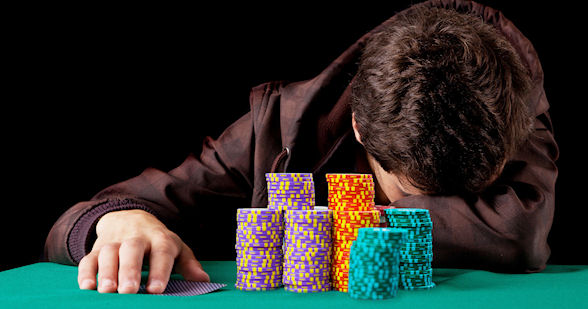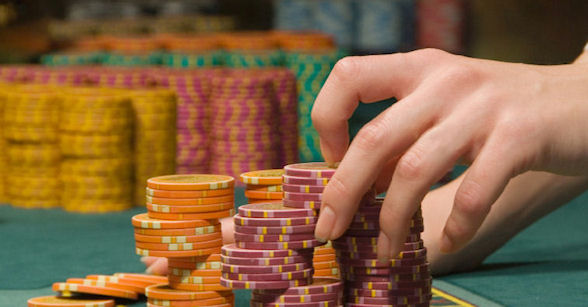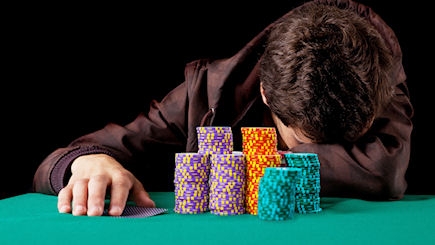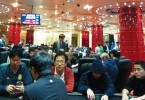This article first appeared in the Jan/Feb 2014 issue of World Gaming magazine.
Whether you are winning or losing, it can often be difficult to drag yourself away from the poker table. But playing for too long – or walking away from a good game prematurely – can be bad news for your bankroll. So how do you get it right? WGM looks at some important considerations to make when deciding whether to keep pushing on or to call it quits for the night.
It was June 2010 when well-known poker pro Phil Laak went about breaking the official world record for the longest continuous cash game session ever played.

Phil Laak
Taking on a revolving door of opponents at the Bellagio in Las Vegas, Laak played non-stop for a remarkable 115 hours – almost five days – and incredibly managed to emerge with a profit of US$6,766.
Speaking later about the experience, the 38-year-old described it as “involuntary trauma – it’s a very weird form of trauma where you’re forcing yourself to do something that is very unpleasant.”
In Laak’s case, the session was all about etching his name in the Guinness Book of Records with his profits being donated to charity, but it does raise an interesting question when it comes to sitting at the tables – how long is too long?
When should you push yourself to keep playing and when should you cut your losses and run? There are a number of factors we need to consider.
The first is pretty obvious – fatigue. Because poker is very much a game of the mind requiring deep thought and in many cases some in-depth hand analysis, it’s important that you are on the ball when at the tables.
The more tired you are, the harder it will be to concentrate and you’ll make more mistakes as well as missing more opportunities.
In fact, playing when tired is probably the single biggest threat to your bankroll. It might have taken you eight hours to build that stack up from $500 to $2,500 but it only takes a few poorly played hands to lose the lot.
Poker players often talk about the dangerous final hour of a long cash game session and there is good reason for that. The combination of fatigue and the bizarre mind games your brain tends to play on you when you’ve decided to soon call it quits can lead to some truly careless decisions.
So the first piece of advice is to bite the bullet and leave the minute your mind starts to wander and your eyes start to close involuntarily.
This leads us to our next factor – are we winning or are we losing? Sometimes, no matter how well you play, the cards just aren’t going to fall your way. Most of us have learnt over time that bad beats are part and parcel of poker. Sometimes your Aces get cracked, sometimes your opponent hits that miracle gut-shot. We deal with it and we move on.

When Lady Luck turns against us and a bad beat is followed by another and another, it can be hard to keep playing at your best. Frustration isn’t a good mindset to have at the poker table, so if you feel yourself starting to tilt, it’s probably time to go home. As they say, money saved is as good as money earned.
That said, the opposite is also true. Often when you run well, you play well. The positive mindset you gain from watching your stack grow skywards can make a big difference to your decision making and often this is a great opportunity to stick around longer than you were planning in order to take advantage of the situation.
It is important to state here that we are not advising leaving because you are running bad and staying because you are running good because of that session’s prevailing “luck”. The reason you leave or stay is because of the effect that “luck” has on your own mindset – and that of your opponents too. When you are running bad your opponents tend to move in for the kill and play better against you. When everything is going your way, your opponents tend to fear you and become timid, making more mistakes when they get involved in hands with you.
If you recognize you have a big edge in ability over the majority of players at the table, perhaps you should consider extending your session just a little bit longer. You won’t always be gifted a table full of fish (depending on what stakes you’re playing) so don’t waste the opportunity when it finally presents itself.

Be careful not to forget about our original point though. Even if your opponents are way out of their depth, if you play while fatigued you’re simply going to bring yourself back to the field.
So what should you do to keep yourself alert if you’ve decided a long poker session is the way to go? Firstly, make sure you’re well rested. There is no point even bothering if you’re tired before you’ve played a single hand.
Make sure you’re well hydrated. This means drinking lots of water and steering clear of quick fix drinks such as coffee or energy drinks. Although a macchiato might give you a quick shot of energy at the time, in the long run it will actually dehydrate you which leads to fatigue.
And finally, even if you’re feeling good, take regular breaks. Stand up and stretch your legs. Go for a walk or, even better, head outside for 10 minutes. The dim casino lighting can get to you after a while so take the time to breathe in some fresh air.
It might not seem like much, but clearing the mind can be one of your most valuable tools when working your way through a long session at the poker table.

Oh, and for the record, Laak’s cash game world record didn’t last too long. In 2012, former UK soldier Barry Denson played for an exhausting 120 hours and 20 minutes at the G Casino in Manchester. Like Laak, Denson’s marathon effort was for a good cause with his £850 profit going to a charity called Help For Heroes, but we don’t recommend going to similar lengths with the Englishman admitting to experiencing aural hallucinations.
“At one stage I was sure that I could hear small children laughing and playing around the slots, which were quite close to the table,” he said afterwards.







